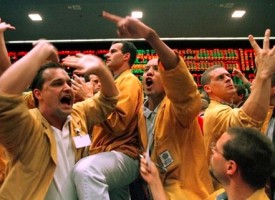With continued uncertainty around the globe, here is a tragic tale about how one man lost $83 million, which was his entire fortune. Plus, a look at China’s massive stockpiling, catastrophe for the dollar and a major warning for the West.
How One Mast Lost Everything
(King World News) Stephen Leeb: “In 2002, Andrew “Jack” Whittaker, 55, seemed the epitome of the American dream. The self-made head of a successful construction company that had made him a millionaire, married with a family, he seemed to have it all. Then he won the Powerball lottery, a record $315 million, which he took in a lump sum of around $83 million after taxes…
Continue reading the Stephen Leeb interview below…
Advertisement
To hear which company investors & institutions around the globe are flocking to
that has one of the best gold & silver purchase & storage platforms
in the world click on the logo:

Stephen Leeb continues: “His work ethic gave way to reckless spending and dissolute living, and within a decade he was a broken man, divorced, accused of bouncing checks to cover gambling losses, his daughter and granddaughter dead from drug overdoses.
What does this woeful tale have to do with gold? Almost exactly 45 years ago, in August 1971, President Nixon took the U.S. off the gold standard. The U.S. no longer would redeem dollars for gold at a fixed rate of $35 per ounce, as it had committed to doing following World War II. And that turned out to be akin to hitting the biggest jackpot in history – with all the euphoria along with the unintended devastating consequences.

Once the dollar and gold were delinked, the U.S. had no restraints on printing all the money it wanted. It was like having a credit card where the sky was the limit. That’s because, even absent the gold link, the dollar remained the world’s de facto reserve currency thanks to U.S. economic and military dominance. It was the one currency people everywhere felt comfortable using, not only for international transactions but sometimes even within countries themselves.
But like Whittaker and many other lottery winners, we lost our identity. After 1971, our culture of savings gave way to a culture of spending and a search for instant gratification, with long-term planning out the window.
Our health care system is one example. Instead of the kind of careful planning that characterized European and Japanese health care systems, we assumed the more money we spent the better. Today U.S. per capita health care spending is still far higher than in both Switzerland’s private-consumer-oriented system and the government-oriented systems in Britain and Japan – while life expectancies here are notably lower than for any other developed country.
One thing our health care system does have more of is complexity of management and regulation – from PBMs to insurance companies to hospitals to distributors to insanely complicated payment schedules. There are layers upon layers, and at each one there are managers, regulators, and executives – which means costs and salaries that dwarf those of any other country. We created such a complex system simply because we could: we had the money to waste, and it’s easier to waste money than think things through. One particularly shocking statistic is that according to the World Health Organization, so-called “healthy life expectancy” is about the same in China as in the U.S.
 Take The Money And Run
Take The Money And Run
When money is there for the taking, it’s no surprise that money’s originators end up with the most. Our finance industry – banks, credit card companies, private equity firms, insurance companies, hedge funds, wealth management companies, etc. – accounts for about 25 percent of U.S. corporate profits. This compares to an estimated less than 10 percent globally. Even more striking, the money taken home by participants in the financial industry here amounts to nearly 10 percent of GDP.
What does the country as a whole gain from all the money lavished on its financial sector? Little if anything. Nano trading, in which computers make countless trades every second, is an egregious example. It benefits the well-paid traders carrying it out, leaving everyone else as bag holders. As for all those fancy complex financial product offerings – well, you saw the results in 2008.
The vast amount of money funneled to money’s originators explains why income inequality is greater here than in any other developed country. Such inequality feeds right back into the failings of our health system: life expectancies and one’s place on the income ladder are directly correlated throughout the world.
Today, some 45 years after we ditched what some have termed a “barbarous relic,” we could be on the verge of becoming a barbarous civilization. The dollar’s days as the world’s reserve currency are numbered.
 Catastrophic For The Dollar
Catastrophic For The Dollar
Either anger stemming from middle-class poverty will boil over, conceivably making it politically expedient to dissolve debt and leading to massive deflation. Or, more likely, resource scarcities will set off a major scramble that will lead to high inflation. Both could be catastrophic for the dollar.
We have our work cut out for us. Going right along with the ability to create instant money has been an abdication of any long-term perspective. This shows up alarmingly in how increasingly dependent the U.S. is becoming on other countries for essential resources. Every year for at least the past 20, more and more resources show up on the USGS list of those for which we import more than 50 percent of our needs. These are the resources, ranging from rare earths to silver to copper, needed for our computers, for electric cars, and for a future. And we don’t have nearly enough of them.
The RoadIn the U.S., computers have gone mainly to indulging our growing appetite for instant gratification. China, by contrast, uses computers – and it’s now building faster ones than ours – to secure its long-term future. They’re long-term planners. We used to be – and our only hope is that we will find our way back to being so again.
A vivid example of the difference between instant gratification and saving for the future can be found in the commodity trading pits. When the Chinese trade gold, they are trading physical gold, which is withdrawn from vaults. When we trade gold, we are trading “IOUs” and “You owe me’s.” Taking delivery of the real stuff almost never happens. Indeed, as much physical gold is delivered in a single week in China as is delivered during an entire year in the U.S.
In other words, with us, trading gold is a form of gambling. We want the immediate rush of winning. In China, the idea is to accumulate a long-term asset at a reasonable price.
 China Is Stockpiling
China Is Stockpiling
Whatever China’s near-term growth rate today, which we are so fixated on, their imports of oil, iron ore, copper, and virtually all other minerals they don’t produce, continue to grow rapidly and beyond their current needs. They are stockpiling for the future.
Yet how many news stories have you seen on those massive imports? It’s a good bet that this article is the first one you’ve seen. Going along with this, China is hoarding everything of value that it produces, from gold to silver to rare earths.
The only way to allocate scarce goods is with another scarce good that is trusted. Gold fits that bill above all.
I can’t change our immediate fate but I can tell you this country risks going the way of Jack Whittaker. The only way to avoid such a fate is to make sure you have what so few Americans have – that metal that made the era between 1946 and 1971 so great, gold.”
***KWN has now released the extraordinary audio interview with legendary short seller Bill Fleckenstein, where he discusses the short-term and big picture in the gold, silver, mining, and global markets, and you can access it by CLICKING HERE OR ON THE IMAGE BELOW.
***To hear about the gold and silver markets, listen to the jaw-dropping audio interview with Michael Belkin, the man who advises the most prominent sovereign wealth funds, pension funds, hedge funds, and institutional funds in the world discussing the historic run in the gold & silver markets, what to expect next for gold, silver and the shares and much more by CLICKING HERE OR ON THE IMAGE BELOW.
© 2016 by King World News®. All Rights Reserved. This material may not be published, broadcast, rewritten, or redistributed. However, linking directly to the articles is permitted and encouraged.









